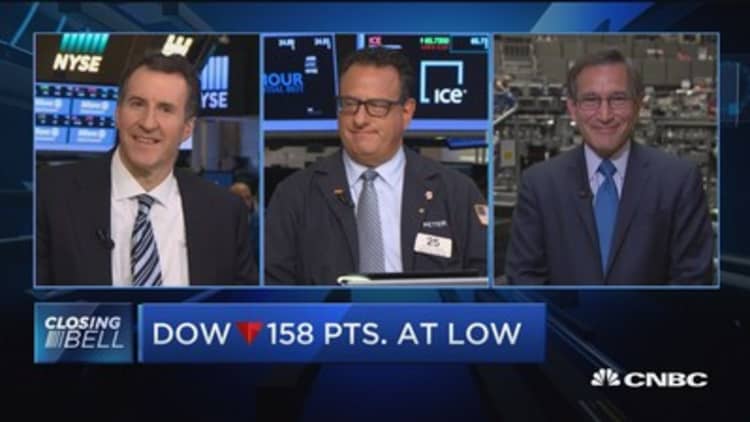Sometimes a comedown can be reassuring.
With stock market indexes at record highs and equities volatility at a low not seen since 1993, some market observers wonder whether investors are being complacent. But new data shows that six months into the Trump era, investors who manage $1 million or more in a brokerage account have come a long way down from their post-election market euphoria. But they do remain baseline bullish on the stock market and the economy.
The drop in millionaire investor outlook is significant.
Sixty-one percent of self-directed investors with $1 million or more in a brokerage account say they are bullish on the current market, but that's down from 74 percent who said they were bullish in the second quarter, according to a survey of wealthy investors conducted by E-Trade Financial and provided exclusively to CNBC. The percentage of bearish millionaire portfolios spiked to 39 percent in July from 26 percent in the second quarter.
The majority of million-dollar accounts are staying in the market, but with diminished expectations.
"These presumably more experienced investors know the market won't move in one direction forever," said Mike Loewengart, vice president of investment strategy at E-Trade. "They're seeing these gains they've experienced, and because many have been through various market environments, they know it won't persist forever."
| ETF | YTD return (%) |
|---|---|
| S&P 500 | 10.33 |
| Nasdaq | 21.97 |
| Dow | 8.97 |
Source: CNBC, 07/21/2017
Maybe the most compelling data point is how far and how fast millionaire stock portfolios are moderating their outlook: 35 percent of investors with $1 million or more in a brokerage account believe the stock market will stagnate over the rest of the year — neither rise nor fall by 5 percent or more. That's up from 26 percent in the second quarter.
The E-Trade executive surmised that investors are taking what they hear from the Fed about disappointment with inflation and stagnation of wage increases and pulling it into their overall market positioning. "They see their equity positions at these higher values than ever before in some cases and recognize it can't go on forever." He added, "But they don't really see any specific factors that are causing them to believe in a near-term pullback."
| How do you predict the market will end this quarter? | Q3 2017 | Q2 2017 |
|---|---|---|
| Rise | 51% | 56% |
| Stay basically where it is | 35% | 26% |
| Drop | 14% | 18% |
Source: E-Trade Financial
Never in at least the past 30 years have all three major regional stock indexes — the S&P 500, MSCI Europe and MSCI Asia-Pacific ex-Japan — gone a calendar year without falling at some point by at least 5 percent, according to a recent Wall Street Journal report. None have fallen by that percentage so far in 2017.
"People aren't as worried as you'd think they would be," said Karen Altfest, principal advisor and executive vice president of client relations at wealth management firm Altfest. "This has been a very long cycle." She added, "People are saying, 'This isn't so bad. I can ride out six months of nothing much happening. If the market does nothing for a while, it's no big deal.'"
This matches the view from Wall Street in the just-released CNBC Fed Survey, which shows respondents only expecting a 1 percent rise in the S&P 500 by year-end.
Millionaires get tougher in grading the economy
There was a huge drop among million-dollar accounts that believe the economy can handle more Fed rate hikes this year, from 83 percent in Q2 to 62 percent in the third-quarter survey, but the new number still represents a majority view comfortable with another rate increase.
Loewengart said clients understand how extraordinary monetary policy was in wake of the crisis. "When they think about rate increases from here, it's reasonable to have investors expect we will see more. Maybe pacing will change, but the overall direction will not change," he said.
More from ETF Strategist:
An advisor's search for something to buy beyond FANG stocks
The only place in the market where active is still beating index funds
Retirement-plan bets on stock market keep going up
The survey, conducted from July 1 to July 11, was completed before the Senate's failure to move ahead with a vote on its health-care bill early last week. The Senate is expected to vote on opening a new round of debate on health care Tuesday, though the details haven't been made clear.
Political uncertainty adds a layer of concern. "The labor metrics still seem pretty good, but there's the potential for highly anticipated policies not getting implemented, and that's weighing on their minds as well — tax reform and infrastructure spending," Loewengart said.
The E-Trade data shows a significant decline in the overall grade many millionaires give to the U.S. economy. Millionaires who give the economy a grade of B dropped by 17 percent in the third quarter. While millionaires grading the economy between a C or D combined for a 12 percent increase.
| What grade would you give the US economy right now? | Q3 2017 | Q2 2017 |
|---|---|---|
| A | 12% | 8% |
| B | 45% | 62% |
| C | 36% | 28% |
| D | 5% | 1% |
| F | 2% | 1% |
Source: E-Trade Financial
Record-low market volatility, as measured in the VIX, has led some market observers to conclude the worst is yet to come and investors have their heads in the sand. But the rise of index funds and ETFs is a significant factor in investors staying in the market even amid reasons for concern.
"The only ones among our clients who feel concerned are not saying, 'Get me out,' but 'How can we lower our costs?'" Altfest said. "We've seen a surge in Vanguard, and that's one of the drivers of this — I'll still be in stocks but pay less."
So far this year, index fund and ETF giant Vanguard Group is on pace to surpass its 2016 asset flows, with $126 billion taken in so far in 2017, according to Morningstar. The ETF industry as a whole is taking in assets at a record pace, as evidenced in the recent BlackRock earnings.
"It all adds up to investors not seeing glaring red flags, and all contributes to passive equity markets and millionaires recognizing it won't always go up," Loewengart said.

Among sectors, millionaire investors are showing increased appetite for financials, while shedding technology stocks. Those who said the tech sector offered the best potential declined from 47 percent to 39 percent, while those highlighting financials increased from 53 percent to 62 percent. Additionally, as Trump's agenda stalls, some of the trades associated with it have weakened, and that's reflected in the new E-Trade data, with the percentage of million-dollar portfolios citing industrials as having the most potential falling from 35 percent to 26 percent in Q3.
"Enthusiasm from the Trump victory has worn off," said Mitch Goldberg, president of investment advisory firm ClientFirst Strategy. But he said the old playbook seems to have been thrown out by investors. "Stocks are already up a good amount this year, and techs are up a lot so far for 2017. They could go to all cash right now and call it a good year."
Millionaires in search of a stock market catalyst
A report from Goldman Sachs on Monday indicated there's no way to view the market but as overvalued. "Our economists forecast the Fed will raise the funds rate once more during 2017 and four additional times during 2018, above the level implied by the futures market," the note said. "Consequently, investors will likely need to rely on earnings growth rather than valuation expansion to generate any returns."
"If we see strong earnings and consistent earnings growth, that will lend itself to more equity gains. And if we see any indications of progress on the policy front, that could lend itself to pushing markets higher," Loewengart said. For now, "expectations have been diminished after such strong gains in the first half of the year, but no key economic indicators or critical geopolitical events point to trouble ahead."
A more dire outlook exists. Mark Zandi, chief economist of Moody's Analytics, told CNBC for its Fed Survey on Tuesday that he believes "investors are complacent."
But financial advisors are dealing with a client base that is feeling less complacent and more concerned that staying on the sidelines will cost them. Jeff Rose, CEO and founder of Alliance Wealth Management, said even clients approaching retirement are definitely leaning toward being bullish. "We feel most are more concerned about missing out on a rally that hasn't shown any signs of slowing down."
Note: The E-Trade survey was conducted among an online U.S. sample of 959 self-directed active investors who manage at least $10,000 in an online brokerage account. The data on investors with at least $1 million in brokerage accounts is broken out exclusively for CNBC.





